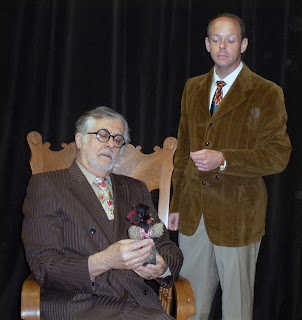 |
| Tom Milligan as Freud and Andy Brown as Lewis |
Photo By Shelley Klimes
Amana - Mark St. Germain's Freud's Last Session takes us to Sigmund Freud's studio in London, just weeks before his death. Here we meet a young professor who would grow to be as influential, in his own way, as the aging psychoanalyst: C. S. Lewis, author of The Chronicles of Narnia as well as numerous books on theology. The conversation that follows is a fanciful encounter where the pair of great thinkers argue privately the views they put forth in their public writings. Freud, an atheist critical of religion, has invited Lewis to his home so that he can ask him in person: why did he give up atheism? Thus ensues an age-old debate, a debate that Old Creamery's audiences, seated before the intimate Studio Space, get front-row seats for.
Freud was a brilliant doctor who is credited with developing the practice of psychoanalysis. He spent much of his career talking to his patients and analyzing their dreams; he championed the idea that neurotic behavior often stems from repressed desires. Though he spent so much time dealing with the symbolic and even used myths as allegories to explain his ideas, he was critical of religion and often wrote against it. Christianity, he tells Lewis in the play, is simply the search for a ideal father figure.
Part of the reason Freud is an interesting figure to portray is that he was so full of contradictions. Though he disavowed organized religion, he was fascinated with mythical figures and collected figurines from all the world's religions. Though he considered himself a skeptic and a scientist, he had an almost dogmatic adherence to his own explanations of psychological illness, and many later psychologists rejected him, finding little evidence for his theories. Freud's Last Session shows us Freud at the end of his life, displaced to London due to Hitler's rise to power, fighting oral cancer from his lifelong habit of smoking. Milligan does a great job of portraying Freud's pain and his passion, his gallows humor and his sharp mind. His intimate, honest approach to the character gives us a hint of how interesting and complex this man was.
Lewis is an equally curious figure -- though raised in a religious family, he spent much of his youth as a fervent atheist. He fought in World War I and returned to Oxford to teach. It was only later that, through the influence of writers like Chesterton and Tolkein, he came back around to Christianity and, at the age of 32, began attending church and writing and speaking on faith. Later he would give wartime lectures to his country over the radio, and give children's literature a lasting Christ figure in Aslan the Lion, but at the time of Session he has recently published his first work of fiction: Pilgrim's Regress, a satirical novel that sets Pilgrim's Progress in the modern cynical world of fascists and atheists. Freud probably took notice of the work, if only because he was parodied in it.
Lewis' work as a Christian apologist is interesting because he uses logic and allegory to explain his views; there's a certain humility to the business that belies the bluster and arrogance of a fire-and-brimstone preacher. Andy Brown gets this quality across extremely well: his Lewis is calm, congenial, and good-humored; he rarely lets Freud, for all his mocking and prying, get under his skin. He's not naive enough to think he's going to convert the old scientist on his deathbed, but at the same time he's not going to be quiet about something he's spent so much energy thinking about.
The philosophical nature of this material might give you pause, and leave you wondering whether this is appropriately dramatic material for a play. Though it does seem a bit talky at times, I think this works well, especially as a small studio show, for two reasons: first, it's highly relevant. If you took away a few topical references, these two could be having this conversation today. The question of whether or not God exists, and all the philosophical and moral questions that seem to hinge on it, is still a huge part of our intellectual culture, and the arguments of Freud and Lewis are frequently cited by modern thinkers. It's obviously something we still care about, and it makes good material for a talkback.
Second, St. Germain's choice to set the play when he does brings in some inherent drama. Freud is dying, and the question of what his legacy will be is in the air. Lewis is still relatively young; he has only taken a few steps along the path that will make him a household name. So the question of mortality and purpose comes up again and again, both explicitly and implicitly. At the same time, World War II has just broken out -- this is why Freud came to England in the first place. As the radio gives news of the invasion of Poland and England's response, and we hear air raid sirens and planes taking off, the philosophical conversation is broken up by sudden, immediate danger. The cast, with help from director Rachael Lindhart, plays these moments well. Their fear and excitement is as believable as their casual chat, and altogether the piece is well-paced. Kudos as well to costume designer Marquetta Senters, who dresses these two famous writers in a way that is immediately recognizable.
Freud's Last Session plays through April 21 at the Old Creamery Studio Stage, 3:00pm Sundays and Thursdays, 7:30pm Fridays and Saturdays. Tickets here.

No comments:
Post a Comment